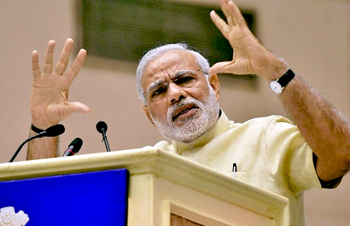New Delhi, Apr 19: Prime Minister Narendra Modi on Sunday said that the agreements with France and Canada are big achievements and would have a huge impact in the coming days.
 Addressing members of parliament of the Bharatiya Janata Party, Modi said that even though every government tried to push through the nuclear deals, but it was successful now.
Addressing members of parliament of the Bharatiya Janata Party, Modi said that even though every government tried to push through the nuclear deals, but it was successful now.
Modi discussed the various government schemes and said that the government has been dedicated to the poor of this country from the very first day.
During his address, the prime minister also spoke about India's success in the rescue process during the Yemen crisis and lauded Ministers Sushma Swaraj and V.K. Singh for their efforts.
He also said that the government should always be thankful to the people for reposing their faith in them and electing them with a complete majority.
The meeting took place just days before the Modi government completes a year in office.





Comments
Add new comment